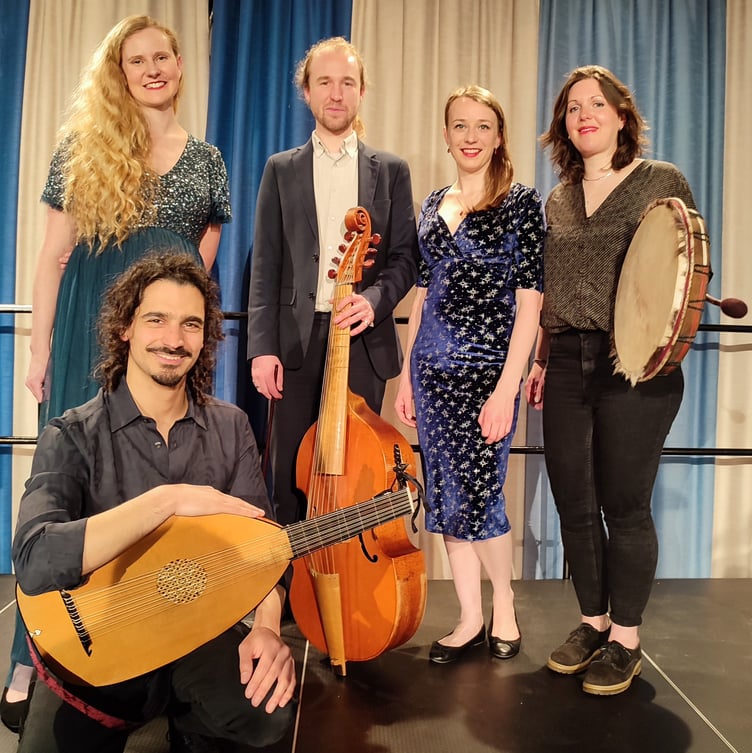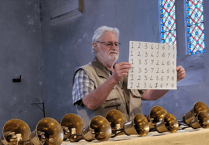Jeff Collman reviews Fair Oriana after their performance for NADSA Concerts
Fair Oriana’s programme made me wonder how this expert ‘Early’ Music group would knit it all together, - and cope with Duke Ellington. We were promised popular songs from good Queen Bess’ time, alongside Tudor tinted arrangements from the reign of Queen Elizabeth II.
Lucinda Cox and Angela Hicks opened the concert singing ‘It is the Lords doing’ from Psalm118, - an ancient text; but modern musical style. The stage was set for more conundrums. On hearing she was to succeed the throne, Queen Elizabeth I fell to her knees and quoted this text. A 16th century lute solo followed, ‘Monsieurs Almaine’.
Then headlong to the 20th century with Lennon-McCartney’s ‘Blackbird’ and ‘Her Majesty’, both unique renderings; followed by a sombre 16th century instrumental ‘Bonny Sweet Robin’.
And then for something else completely different – ‘Blue Velvet’. The sultry warmth of voices in this duet dispelled any idea that our performers were uneasy beyond Elizabeth I styles. Whether we were with Bobby Vinton or in David Lynch’s nightclub, we had been transported to something very 20th century.
Sam Brown, lutenist, related the Arabic and Spanish roots of the lute, and endearingly said it ‘never raises its voice’. Sam reminded us that Robert Earl of Essex had initially been in Elizabeth I’s favour, but later he lost his head. Sam’s gentle stately lute solo suddenly had a sinister edge.
Angela and Lucy both sparkled in timeless costumes – well both Elizabeths were set apart from the masses by their finery – whilst the instrumentalists had to rely on other talents.
Harry Buckoke, violist da gamba, told us that Duke Ellington was presented to Elizabeth II, and that he would be playing Ellington’s version of ‘Sophisticated Lady’. If Ellington’s composition is about mood creation, then this performance was a hit.
Sarah Dollar gained the limelight in ‘Fortune my Foe’. Her ominous soft but insistent drumbeat, made sinister the period setting of the progression to the gallows. No vulgar drama of a beheading, just the fading of the drumbeat. A shiver down one’s spine.
Elizabeth I realised that love and politics don’t mix. She was fond of the Duke of Anjou, referring to him as her ‘Froggie’, but politics decided he had to return to France. Sam impishly added that soon after this return, the Frog croaked. Cue for a delightful Dowland lute ‘Frog Galliard’, contrasted with Fraser Wilson’s ‘On Monsieur’s Departure’ where both lyrics and musical style portrayed conflict and duality of emotion.
Elizabeth II reportedly [in the Sun] said that ‘I’m in heaven’ was her favourite song. The smoochy tones of Lucy’s first verse lent credibility to the notion, - then Angela broke the spell with her entrance of “I’m in Devon”!
The Jewel in the crown for me was John Wilbye’s, ‘The Lady Oriana’ – a showcase of high pure notes and interweaving melodies with our period instruments. Hurrah!
For our encore, what could have been more poignant, with wars in Europe and the Middle east, than an American lyricist getting it wrong with Blue birds over the ‘White cliffs of Dover’. The heart-rending melody was a hauntingly bittersweet way to leave us going out, singing a tune!
An amazing evening. Such diversity of genres was tricky to embrace: one never quite knew what was coming next, and the above is only a sample of the items performed. It was certainly a unique experience for me, and a high note for Nadsa concerts to close its season.





Comments
This article has no comments yet. Be the first to leave a comment.